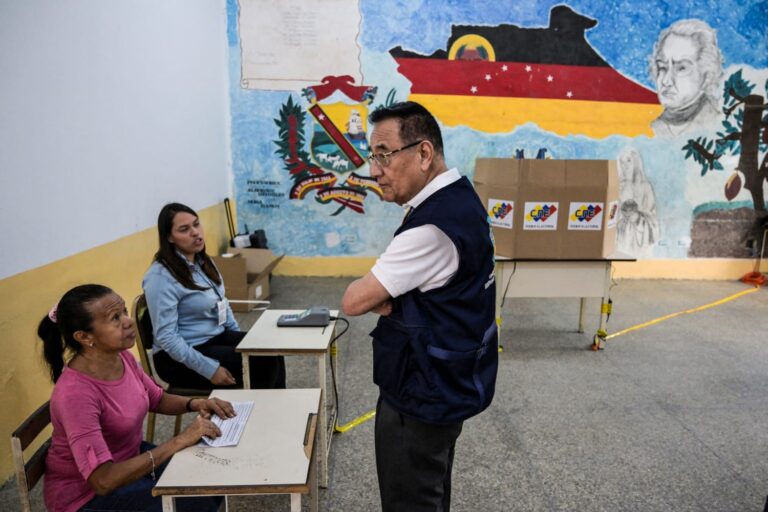Venezuelans are preparing to take part in the most significant presidential election the South American country has seen in more than a decade.
On Sunday, voters will have the chance to elect a new leader who could bring about an end to the long-running Chavista regime, a socialist-inspired political movement that turned to authoritarianism and began with the election of Hugo Chavez nearly three decades ago and continued under the leadership of his protégé Nicolas Maduro.
Maduro, who is seeking a third term in office, has threatened “bloodshed” if he is not elected, and the United States has warned him that fair elections must be held without any intimidation or repression.
Maduro is facing 10 presidential candidates, with Edmundo Gonzalez seen as the candidate with the best chance of beating him.
Gonzalez, a former diplomat, was little known to Venezuelans until he formally ran for president in May to replace opposition leader Maria Corina Machado, who had been barred from running by the Maduro government over allegations of fraud and corruption, in what was seen as an attempt to undermine legitimate elections.
Machado, a conservative former lawmaker, gained huge popularity after winning primary elections in October and his endorsement of Gonzalez makes him a strong challenger to Maduro.
As concerns continue over Venezuela’s free and fair elections, here are three things you need to know about what’s at stake.
What is behind the Venezuelan crisis?
Venezuela’s protracted economic, social and political crisis has pushed millions into poverty and resulted in the world’s largest displacement crisis, with an estimated eight million Venezuelans migrating to other parts of Latin America, the United States and other countries.
The once economically prosperous country boasts the world’s largest oil reserves. Financial mismanagement of the oil sector under the Maduro regime, combined with harsh sanctions imposed by the United States in 2019, caused a domino effect that led to the collapse of the Venezuelan economy and the beginning of a humanitarian crisis in which people lacked access to food, medicine and other basic necessities. More than 80% of Venezuela’s people live in poverty.
Against this backdrop, opinion polls have begun to show that support for President Maduro and the Chavez government is waning. This shift has rekindled hope among Venezuelans, who see Sunday’s elections as “the last chance to change the country,” according to a poll released by the Association of the Americas/Council of the Americas.
Opposition parties and leaders have capitalized on this sentiment to rally supporters and strengthen their calls for the restoration of democracy.
Why isn’t opposition leader Machado running for office?
Machado has become a driving force in Venezuela’s opposition movement since winning primary elections in October.
Machado rallied support by promising to rebuild Venezuela’s economy in the hope that many of those who had fled would be able to return home.
Her voter mobilization efforts were able to overcome deep-rooted political apathy born of years of government repression by a regime known for arresting dissidents and suppressing protests.
But Venezuela’s Supreme Court formally barred him from holding public office in January based on allegations of fraud and corruption that Machado denies, meaning he cannot stand in Sunday’s vote.
Gonzalez then emerged as the opposition’s alternate candidate in May, and the two campaigned together until the presidential campaign officially ended on Thursday.
Venezuela’s main opposition party said more than 30 opposition activists have been in hiding or detained since January.
Throughout the election, President Maduro maintained control over the country’s parliament, the military, the National Electoral Commission, the judicial system, much of the media and violent paramilitary groups.
Will Venezuela’s election results be accepted?
That remains to be seen.
Maduro’s threat of “bloodshed” has led allies including the United States, Brazil and Colombia to urge him to accept the election results.
“We support the peaceful elections that we hope and expect will take place on Sunday,” White House spokesman John Kirby said at a daily briefing in Washington. “We cannot tolerate political repression or violence of any kind.”
While many Venezuelans are eager for legitimate elections and a chance to oust President Maduro, they also fear he will find other ways to stay in power. If he does indeed step down, he may negotiate a withdrawal agreement with the opposition to avoid being prosecuted for crimes against humanity in an international court, according to a report in the New York Times. However, few Venezuelans expect the elections to oust Maduro.
Polling stations are scheduled to open at 6am local time on Sunday and close at 6pm. Anyone who is in line by the time the polls close will be able to vote. Results could be known as early as Monday morning.
For more information on NBC Latino, Sign up for our weekly newsletter.


